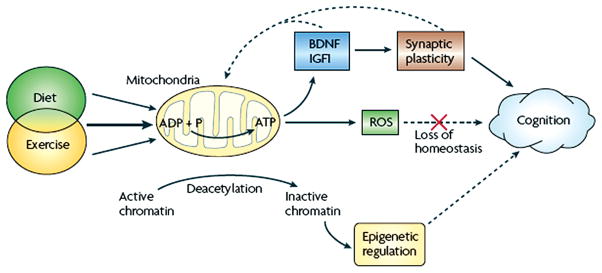Figure 14.

Hypothetical mechanism by which the interaction of exercise with other aspects of lifestyle such as feeding would affect cognitive abilities. Exercise activates molecular systems involved in energy metabolism and synaptic plasticity, and the interaction between these systems influences cognitive function. The same type of interaction may involve epigenetic mechanisms with long-lasting effects on cognition. Diet and exercise can affect mitochondrial energy production, which is important for maintaining neuronal excitability and synaptic function. The combined applications of select diets and exercise can have synergistic effects on synaptic plasticity and cognitive function. Specific energy events may regulate the activation of molecules such as BDNF and IGF-1 that support synaptic plasticity and cognitive function. The mitochondrion manages the balance of energy so that excess energy production caused by high caloric intake or strenuous exercise results in formation of reactive oxygen species (ROS). When ROS levels exceed the buffering capacity of the cell, synaptic plasticity and cognitive function are compromised. Failure to maintain energy homeostasis can gradually affect the cellular machinery associated with cognitive function, and increase the risk for mental disorders. Healthy diets and physiological levels of exercise, which have the capacity to reestablish cellular homeostasis, that is, energy metabolism and buffer ROS, can help to maintain cognitive function under challenging situations. Reprinted, with permission, from reference (73), p. 571.
